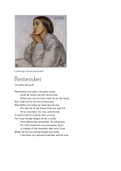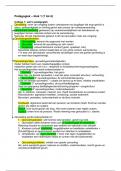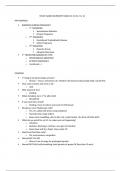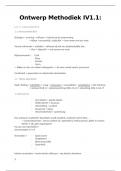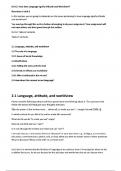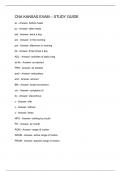Remember
Christina Rossetti
Remember me when I am gone away,
Gone far away into the silent land;
When you can no more hold me by the hand,
Nor I half turn to go yet turning stay.
Remember me when no more day by day
You tell me of our future that you plann'd:
Only remember me; you understand
It will be late to counsel then or pray.
Yet if you should forget me for a while
And afterwards remember, do not grieve:
For if the darkness and corruption leave
A vestige of the thoughts that once I had,
Better by far you should forget and smile
Than that you should remember and be sad.
, VOCABULARY
The silent land - this refers to the place people go when they die, either heaven or
hell, or another kind of afterlife
Counsel - to give advice and help
Corruption - when something is ruined or tainted
Vestige - a trace of something that’s left once it stops existing
STORY/SUMMARY
The speaker first asks the addressee to remember her when she’s gone ‘away’, in
other words when she has died and is in the afterlife - when it’s no longer possible for
her to hold his hand, or to choose to leave or stay with him.
In lines 4-8 she says also to remember her after they stop planning their future
together - and to only remember (nothing more), because praying or trying to help her
will do no good after she’s dead.
Lines 9-14 shift in tone slightly, and contradict the earlier ideas in the poem - the
speaker now says for the addressee not to worry or grieve over forgetting her, and if
her memory ever causes him pain, she would prefer that he forgets her and is happy,
instead of remembering her and being sad.
LANGUAGE
Antithesis - the poem ends on the antithetical clauses ‘forget and smile’ / ‘remember
and be sad’. These two extremes are juxtaposed in order to show the tension
between remembrance and forgetting, as well as between sadness and happiness. It
seems to the poet that forgetting is far less painful, so for her reader to avoid pain
she wishes to be forgotten - this can be interpreted as a selfless and kind gesture,
she would not want to cause pain or trouble to those she loves.
Imperative Verbs - The phrase ‘remember me’ is repeated and contains a command
- to remember the speaker of the poem even after she is no longer around. This
concept is also reinforced by the title ‘Remember’, which could also be interpreted as

